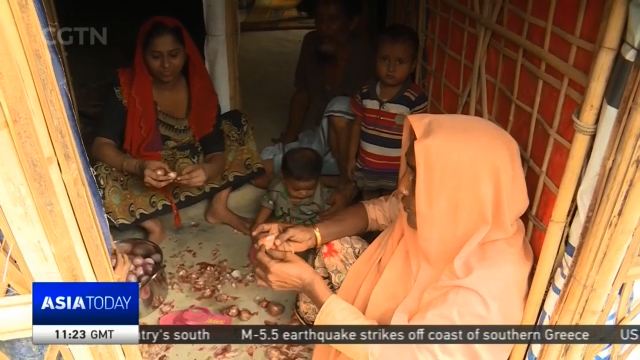
19:38, 25-Jun-2018
Rohingya Crisis: Monsoons put refugees at risk of waterborne diseases
02:21

The World Health organization has warned that monsoons will expose Rohingya refugees to serious health risks. Poor sanitation system is already affecting the health of the refugees, especially children, who are more vulnerable to infections. Ravinder Bawa reports.
Primary health centres in the Rohingya refugee camps in Bangladesh are flooded with patients since morning. Two thirds of patients visiting the doctors are children as they are more prone to infections. Doctors have their hands full as there has been a spike in the cases of severe diarrhea.
BEATRIZ OCHOA HUMANITARIAN ADVOCACY MANAGER "Many organisations are working against the clock to strengthen our facilities and our nourishment centres to keep the children safe."
Grandmothers like Laila Khatun are worried about their children as they keep falling ill these days. She has started boiling water before consumption. But still the risk is high as her house is next to a toilet.
LAILA KHATUN ROHINGYA REFUGEE "This toilet is full. It smells horrible. We are unable to eat or sleep because of bad smell. It's overflowing so we cannot use it. There are a number of problems."
This is a major concern in the camps as most of the tube wells are built few meters away from latrines. Those tube wells that are not dug deep enough to the third aquifer can have contaminated water. Hafsa Begum's three old son Robi Ullah succumbed to a bacterial infection ten days ago. The family was consuming water from the tube well adjacent to a latrine, which she says caused the infection.
HAFSA BEGUM ROHINGYA REFUGEE "It was a big loss and now I worry about my other children. Now I get water from far away and keep it covered."
Poor sanitation in the camps is another reason for spread of diseases. Septic tanks are full and latrines are overflowing. A catastrophe is waiting as when heavy rains hit the coast the camps can be flooded and children will be the first ones to fall sick.
RAVINDER BAWA BANGLADESH "Fifty to sixty patients come to health centres daily. There is no drainage system in the camps and doctors fear that the monsoon will worsen the conditions. Cox's Bazar, Bangladesh."

SITEMAP
Copyright © 2018 CGTN. Beijing ICP prepared NO.16065310-3
Copyright © 2018 CGTN. Beijing ICP prepared NO.16065310-3